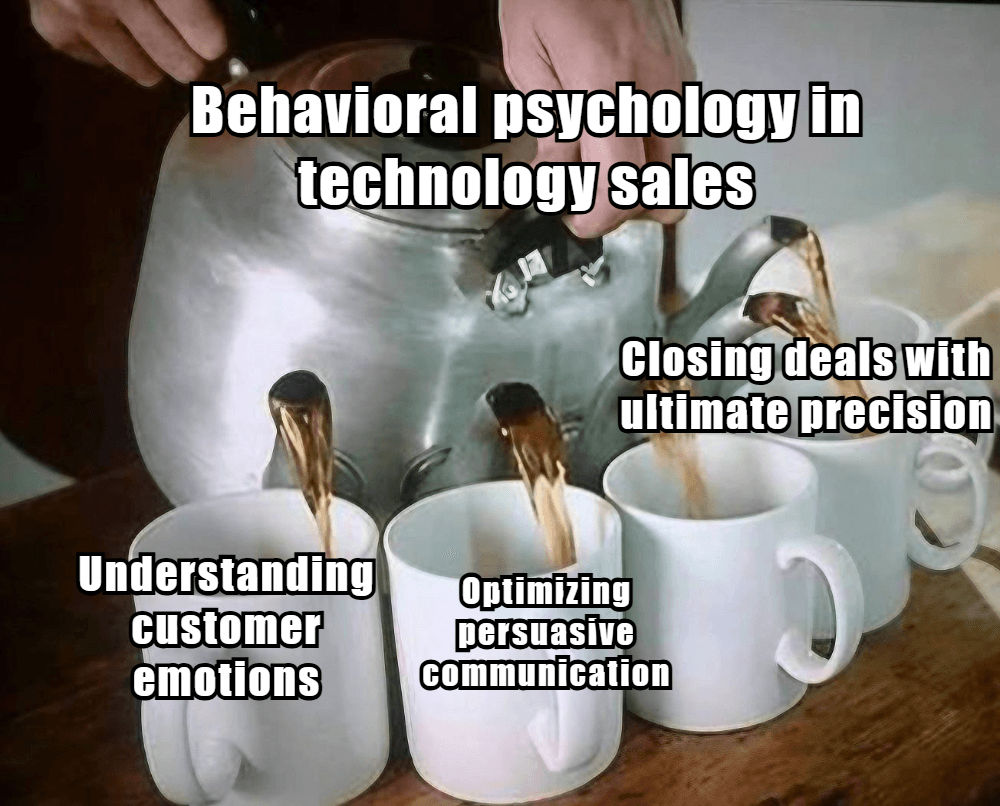Behavioral Psychology in Technology Sales: Unlocking the Secrets of Buyer Behavior
Technology sales is a dynamic field where understanding human behavior can be the difference between closing deals and losing prospects. While traditional sales strategies focus on product features and benefits, behavioral psychology dives deeper into the emotions, biases, and decision-making processes that drive buyers. By leveraging psychological principles, tech sales professionals can craft persuasive pitches, build stronger relationships, and optimize conversions.
In this article, we’ll explore how behavioral psychology impacts technology sales, provide actionable insights, and share examples to illustrate its application. Let’s uncover how understanding buyer behavior can transform your sales strategy.
What Is Behavioral Psychology in Technology Sales?
Behavioral psychology studies how people think, feel, and act in various situations. In technology sales, it involves understanding the emotional triggers, cognitive biases, and decision-making patterns of potential buyers. This approach helps sales professionals align their strategies with customer needs and motivations.
Key Elements
Emotional Triggers: Buyers often make decisions based on how a product makes them feel—whether it’s excitement, trust, or relief.
Cognitive Biases: Psychological shortcuts like anchoring or social proof influence purchasing decisions.
Decision-Making Journey: Buyers move through stages such as awareness, consideration, and purchase, each influenced by psychological factors.
For example, a cybersecurity company might evoke fear by highlighting potential risks of cyberattacks while providing relief through its solutions.
Why Behavioral Psychology Matters in Tech Sales

Behavioral psychology offers several advantages for tech sales professionals:
Improved Engagement: Understanding buyer behavior enables personalized communication that resonates with prospects.
Higher Conversion Rates: Leveraging psychological triggers like urgency or social proof can nudge buyers toward making decisions.
Stronger Relationships: Empathy and active listening build trust and loyalty among customers.
Optimized Sales Strategies: Insights into buyer behavior help refine pitches and target the right audience effectively.
For instance, a SaaS company using behavioral psychology might identify that prospects are hesitant due to perceived risk. By offering a free trial or money-back guarantee, they address this concern and increase conversions.
Key Psychological Principles in Technology Sales

1. Emotional Triggers
Emotions play a significant role in purchasing decisions. Buyers often choose products based on how they make them feel rather than logical reasoning.
Examples of Emotional Triggers:
Fear: Highlight risks (e.g., cybersecurity threats).
Trust: Showcase testimonials or certifications.
Excitement: Promote innovative features.
2. Cognitive Biases
Cognitive biases are mental shortcuts that influence decision-making. Understanding these biases allows sales professionals to craft persuasive messages.
Common Biases in Tech Sales:
Anchoring: Presenting a high initial price to make subsequent offers seem more reasonable.
Social Proof: Demonstrating widespread adoption or positive reviews.
Scarcity: Creating urgency through limited-time offers.
3. Storytelling
Storytelling connects emotionally with buyers by presenting relatable scenarios where your product solves their challenges.
Example: A marketing automation tool might share a case study showing how a small business increased revenue by 40% using their platform.
How Behavioral Psychology Shapes the Tech Sales Funnel

Behavioral psychology influences every stage of the sales funnel:
Funnel Stage | Psychological Focus | Examples |
Awareness | Curiosity and Interest | Highlight pain points through ads |
Consideration | Trust and Credibility | Use testimonials and comparison guides |
Decision | Urgency and Value | Offer limited-time discounts |
Post-Purchase | Satisfaction and Advocacy | Provide excellent onboarding experiences |
For example, during the awareness stage, a cloud storage provider might use ads emphasizing data security concerns to capture interest.
Practical Applications of Behavioral Psychology in Tech Sales

1. Personalized Messaging
Use behavioral data to tailor communications based on customer preferences.
Example: If a prospect frequently visits your pricing page but hasn’t converted, send an email offering a discount.
2. Building Trust
Trust is critical in technology sales, where buyers often hesitate due to perceived risks.
Strategies:
Share customer success stories.
Highlight certifications or awards.
Offer guarantees like free trials or refunds.
3. Creating Urgency
Urgency drives action by making buyers feel they might miss out.
Techniques:
Limited-time offers (e.g., “Offer ends in 48 hours!”).
Countdown timers on landing pages.
Exclusive deals for early adopters.
4. Leveraging Social Proof
Social proof reassures buyers by showing others have benefited from your product.
Tactics:
Display user reviews prominently.
Share case studies on your website.
Showcase logos of well-known clients.
Real-Life Examples

Example 1: SaaS Free Trial Conversion
A SaaS company offering project management software noticed low conversion rates from free trials. By analyzing behavioral data, they identified hesitations around pricing transparency. They:
Sent personalized follow-ups addressing cost concerns.
Added testimonials from similar businesses.
Result: Trial-to-paid conversion rates increased by 25%.
Example 2: Cybersecurity Solution
A cybersecurity firm used fear as an emotional trigger by sharing statistics about rising cyberattacks. They followed up with case studies demonstrating their product’s effectiveness.
Result: Increased lead engagement and faster deal closures.
Conclusion
Behavioral psychology is transforming technology sales by shifting the focus from products to people—their emotions, biases, and motivations. By understanding what drives buyer behavior at each stage of the funnel, tech sales professionals can craft personalized strategies that resonate deeply with prospects.
Whether you’re creating urgency with limited-time offers or building trust through testimonials, applying psychological principles ensures your approach is both effective and empathetic. Embrace behavioral psychology today to elevate your technology sales game!
FAQs
1. How does behavioral psychology differ from traditional sales techniques?
Traditional techniques focus on product features; behavioral psychology emphasizes buyer emotions, biases, and decision-making patterns to craft persuasive strategies.
2. Can small tech startups use these principles effectively?
Yes! Startups can leverage emotional triggers like trust-building through testimonials or urgency with limited-time offers to compete with larger players.
3. What tools can help implement behavioral psychology?
Tools like CRM platforms (e.g., Salesforce), sentiment analysis software (e.g., HubSpot), and email automation tools (e.g., Mailchimp) can help analyze buyer behavior and personalize outreach.
4. How do I measure success?
Key metrics include:
Conversion rates.
Customer retention rates.
Engagement levels (e.g., email open rates).
ROI from psychological tactics like urgency or social proof.